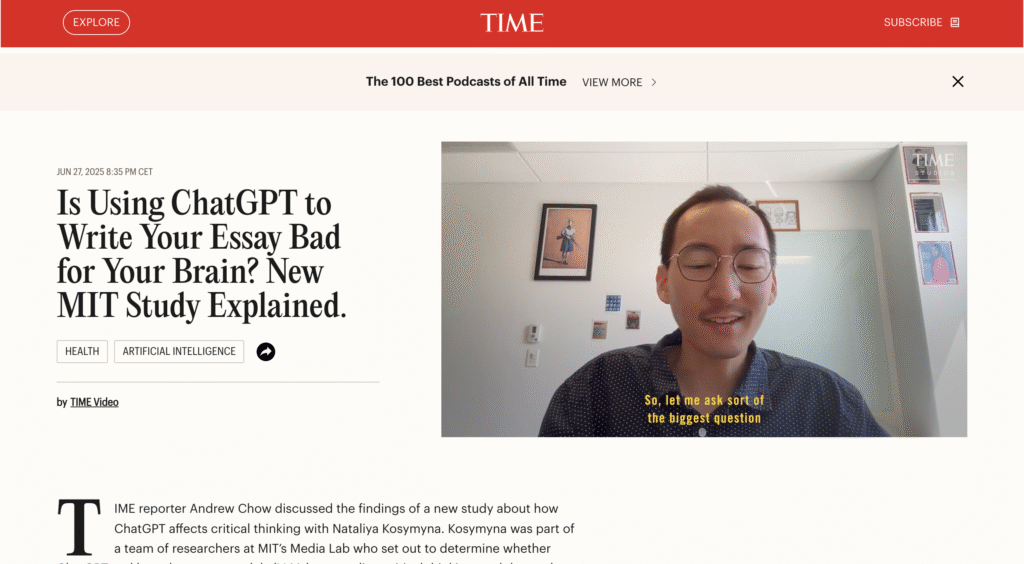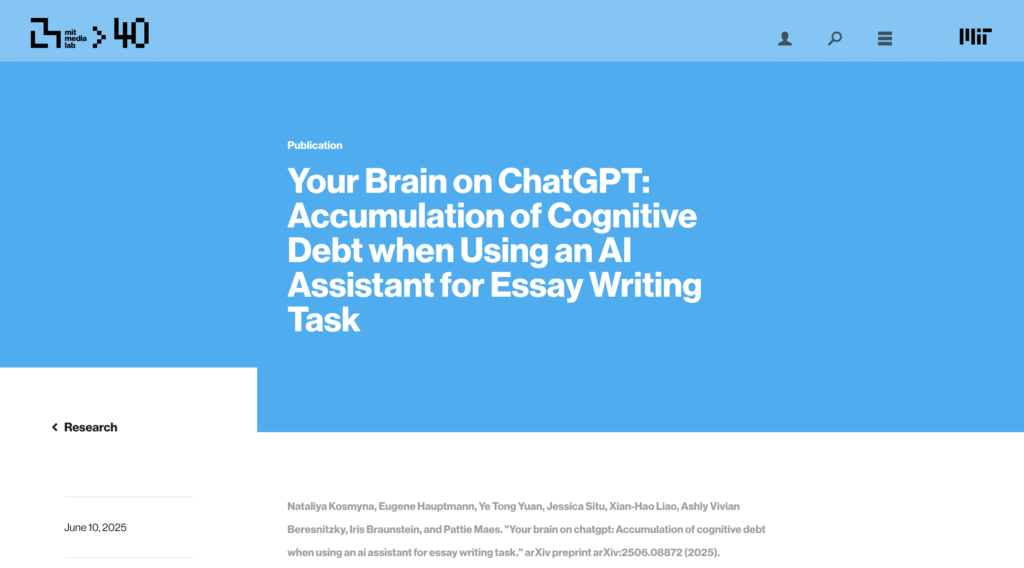"Once men turned their thinking over to machines in the hope that this would set them free. But that only permitted other men with machines to enslave them." "En cierto momento, los hombres cedieron su pensamiento a las máquinas con la esperanza de que eso los liberara. Pero eso solo permitió que otros hombres con máquinas los esclavizaran.”
Frank Herbert, Dune Tweet
Have you ever wondered what happens to your brain when you ask AI to do your job? We’re not talking about efficiency or productivity, but something deeper: your ability to think, create and remember. A recent MIT study and a powerful video by Gustavo Entrala entitled “The EXPERIMENT that WILL CHANGE the way you USE AI forever”, which I leave you below, invite us to ask ourselves an urgent question: are we mortgaging our minds without realizing it?
What is "cognitive debt"?
According to the MIT Media Lab, cognitive debt is the accumulated mental cost incurred when we stop thinking for ourselves and passively rely on AI assistants like ChatGPT. It’s like constantly asking for a crutch your mind doesn’t need… until it forgets how to walk on its own.
The study used a rigorous methodology: three groups wrote essays with different tools (AI, web browser, or just their brain) while wearing EEG headsets to record their brain activity. The results were revealing: the more external support used, the less the brain worked.
Less mental effort, more dependence
The group using ChatGPT showed the lowest brain connectivity and low activation of key neural networks. In contrast, those who typed unaided extensively activated regions related to deep thinking and executive control.
"Cognitive engagement decreases proportionally to the use of external tools."
MIT Paper Tweet
Most disturbing was in the fourth session, where the methods were switched: those who previously relied on AI failed to regain their previous cognitive performance. Their brains, accustomed to comfort, no longer responded with the same intensity. In contrast, those who first wrote alone and then used the AI did show a good level of cognitive integration, suggesting that thinking first protects your mental abilities.
What about memory and authorship?
In addition to brain strain, the study found that AI users had more difficulty remembering their own texts and accurately citing them. The AI gave them functional responses, but did not activate their long-term memory networks.
"The task was executed efficiently and conveniently, but they basically didn't integrate any of it into their memory networks."
MIT Paper | Nataliya Kosmyna, autora principal Tweet
They also reported a reduced sense of authorship: many did not feel that the text was their own. How do you connect emotionally or intellectually with something that was not born from you?

Risks for the learning of the youngest
These findings have worrisome implications for children and adolescents. If they become accustomed to using AI without reflection from an early age, they may be developing passive habits of mind: no critical thinking, no retention, no creativity.
This is not about banning the use of AI, but about teaching people to think before using it. Just as a child should learn to add before using a calculator, he should develop ideas of his own before asking ChatGPT to write for him.

Soulless" essays: the loss of creativity
The study evaluators noted that the AI-generated texts were more uniform, repetitive, and “soulless”. Although well written in form, they lacked originality and depth, reflecting more the model than the author.
"If all students use the same model to respond, we end up with cloned essays that are empty of real learning."
MIT Paper Tweet
In contrast, students who wrote without assistance produced unique, creative, and varied essays, reflecting their individual thinking.
AI is not the enemy, but it's not your brain either.
Using an LLM is not negative in itself. The problem arises when we do it instead of thinking, not after doing it. The same study found that those who first worked with their mind and then used AI managed to combine efficiency with depth.
That’s why AI should be an editor, not a substitute. An aid to polish ideas, not to generate them from scratch. Like any powerful tool, it requires awareness, judgment and prior mental training.
How to pay off your cognitive debt?
Here are some keys to prevent AI from stealing your thoughts:
- Think first. Write a mental or manual draft before asking for help.
- Use it as a mirror, not as a voice. Ask her to help you improve what you have already created.
- Evaluate your response. What would you change? Always have CRITICAL THINKING. This is something I repeat very often to my students.
- Remember: creativity is born of effort. There are no shortcuts to original ideas.

The challenge is not to reject AI, but to prevent it from making us intellectually lazy. In a world saturated with generated content, the truly valuable thing will be your ability to think, filter and create with authenticity.
Let’s not let AI replace the process that most defines us as humans: thinking for ourselves.
Are you using AI as a springboard for your ideas… or as a crutch that prevents you from walking on your own?
How will you teach your children to think before asking a machine for help?
Have a good week!
Sources and reference
MIT Media Lab original study (2025) | TIME – “ChatGPT Is Making Us Dumber” | Your Brain on ChatGPT: Accumulation of Cognitive Debt when Using an AI Assistant for Essay Writing Task |





